Introduction
The “LegalTech Armenia” innovative series, a collaborative effort by the Armenian Lawyers’ Association and Iravaban.net, endeavors to illuminate the convergence of law and technology. This series meticulously examines how the digital revolution is reshaping the legal landscape in Armenia and globally. The visionary behind this initiative is Karen Zadoyan, President of the Armenian Lawyers’ Association.
In this fifth installment of our groundbreaking series, “Artificial Intelligence and Legal Ethics: New Challenges and Opportunities,” we delve into the transformative impact of artificial intelligence on legal practice and scrutinize the ethical quandaries this technological revolution engenders.
Our team of expert journalists and specialists from Iravaban.net, equipped with cutting-edge technological tools and leveraging advanced artificial intelligence applications, will present in-depth analyses, exclusive interviews, and compelling narratives. We will also provide visually engaging infographics and photographic content. Our mission is to elucidate how artificial intelligence, machine learning, and other innovative technologies are revolutionizing legal practice, judicial systems, and legislative processes.
1. Introduction: The Dawn of AI in Law
Artificial Intelligence (AI) is swiftly permeating every facet of our existence, and the legal domain is no exception. Recent years have witnessed AI assuming a pivotal role in the legal sphere, fundamentally altering the work of legal professionals and giving rise to novel ethical considerations.
The American Bar Association’s (ABA) 2021 “Technology Report” reveals a striking statistic: 35% of law firms are already harnessing AI in their operations. The report emphatically states: “AI is rapidly becoming an integral component of legal practice, enhancing efficiency and precision across a multitude of tasks.”
This figure continues to climb as AI demonstrates its value in legal research, document analysis, and even in predicting judicial outcomes.

Symbolic image: A lawyer at the crossroads of AI and law.
However, the burgeoning application of AI also ushers in a plethora of ethical challenges. How do we ensure the fairness and impartiality of AI-driven decisions? What are the implications when AI systems err? Who bears responsibility for decisions rendered by AI?
In this comprehensive article, we will explore the far-reaching impact of AI on the legal field, discuss its myriad advantages and challenges, and endeavor to understand how we can harness this powerful technology while steadfastly upholding the fundamental principles of legal ethics.
2. AI in Legal Practice: The Current Paradigm
Artificial Intelligence has already permeated the legal field extensively, revolutionizing traditional processes and unlocking new possibilities. Here are some illustrative examples of AI’s application in law:
Legal Research and Analysis:
AI-powered tools have ushered in a new era in legal research. These sophisticated systems can swiftly analyze vast repositories of legal documents, identify relevant precedents, and provide nuanced answers to complex legal queries.
For instance, industry leaders LexisNexis and Westlaw have integrated advanced AI tools into their services. The LexisNexis Lexis+ AI platform employs state-of-the-art natural language processing technologies to comprehend lawyers’ inquiries and deliver the most pertinent results with unprecedented accuracy.
Contract Review and Analysis:
AI is revolutionizing contract review and analysis, dramatically accelerating these processes while enhancing accuracy.
A prime example is Kira Systems’ AI platform, which can meticulously analyze hundreds of contracts within hours, identifying crucial provisions, potential risks, and inconsistencies. The company reports that their system can reduce contract review time by an astounding 90%.
Predicting Court Decisions:
AI is also making significant strides in predicting court decisions, empowering lawyers to assess the likelihood of success in their cases with greater precision.
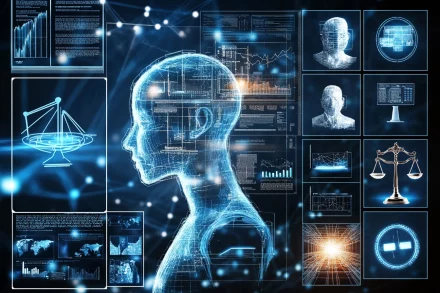
Symbolic image: AI as a catalyst for legal development.
Groundbreaking research conducted by a consortium of prestigious institutions—University College London, University of Sheffield, and University of Pennsylvania—has demonstrated that AI can predict decisions of the European Court of Human Rights with an impressive 79% accuracy. This technological advancement enables lawyers to better prepare for court cases and provide more informed advice to their clients.
Application of AI in Law in Armenia:
While the integration of AI in Armenia’s legal sector is in its nascent stages, there are promising signs of progress. A notable example is Armenia’s e-governance system (e-gov.am), which has begun incorporating AI elements in legal document processing and search functionalities, paving the way for more efficient and accessible legal services.
3. The Transformative Advantages of AI in the Legal Field
The introduction of Artificial Intelligence in the legal domain brings forth a multitude of significant advantages that are revolutionizing lawyers’ work methodologies and enhancing the administration of justice.
Unprecedented Efficiency:
AI dramatically accelerates numerous legal processes. A prime illustration is JPMorgan Chase’s COIN (Contract Intelligence) program, which harnesses machine learning to review commercial credit agreements in mere seconds. This process previously consumed an astronomical 360,000 work hours annually. Thanks to COIN, the bank has substantially reduced contract review errors and expedited the loan approval process, showcasing the transformative power of AI in financial law.
Substantial Cost Reduction:
The implementation of AI enables a significant reduction in legal service costs. According to the authoritative Altman Weil 2020 “Law Firms in Transition Report”, an impressive 74% of law firms reported that the adoption of AI has led to substantial cost reductions, highlighting the economic benefits of this technological revolution.
Enhanced Accuracy:
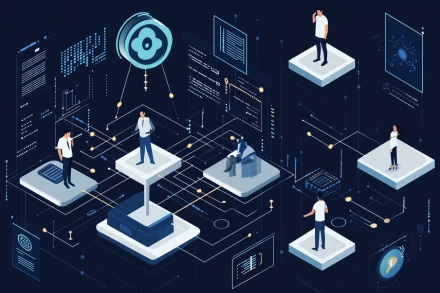
Symbolic image: AI as a catalyst for legal development.
AI systems possess the capability to analyze colossal volumes of data with unparalleled precision, eliminating the risk of human error. A groundbreaking study conducted by LawGeex demonstrated that AI can identify legal risks in contracts with an astounding 94% accuracy, surpassing the 85% accuracy achieved by experienced human lawyers. This stark contrast underscores the potential of AI to elevate the standard of legal work.
Democratization of Legal Services:
AI is instrumental in expanding access to legal services, making justice more accessible to the general public. An exemplary case is the DoNotPay chatbot, launched in 2015, which assists individuals in contesting parking tickets and obtaining legal advice on routine matters. As of 2021, DoNotPay has empowered users to save over $40 million by successfully challenging unfair fines, demonstrating the tangible impact of AI in promoting legal equity.
4. Navigating the Ethical Labyrinth
The integration of AI in the legal field presents a complex array of ethical challenges that demand careful consideration and innovative solutions.
Ensuring Impartiality and Transparency:
AI systems have the potential to inherit and perpetuate human biases present in their training data, raising critical concerns about fairness in legal processes. A notable example is the COMPAS (Correctional Offender Management Profiling for Alternative Sanctions) system, employed in US courts to assess recidivism risk. ProPublica’s investigative journalism uncovered that the system disproportionately classified African American defendants as high-risk compared to their Caucasian counterparts, highlighting the urgent need for bias mitigation in AI-driven legal tools.
Safeguarding Privacy in the Digital Age:
The efficacy of AI systems often hinges on their access to vast datasets, raising paramount concerns about data privacy and security in legal contexts. Law firms must exercise extreme caution when processing sensitive client information through AI systems. The European Union’s General Data Protection Regulation (GDPR) sets forth stringent requirements for personal data processing, which must be meticulously adhered to in the design and deployment of AI systems in legal practice.
Redefining the Human Element in Law:
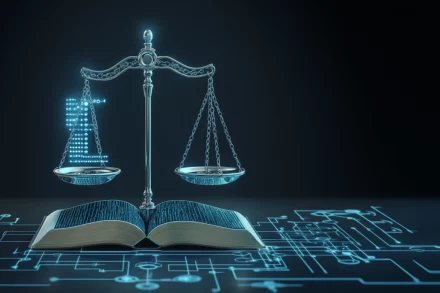
Symbolic image: The combination of AI and ethical rules.
The increasing sophistication of AI has sparked concerns about the potential displacement of legal professionals in certain roles. However, leading experts posit that AI will transform rather than supplant the nature of legal work. The onus is on legal practitioners to adapt to emerging technologies and cultivate new skill sets to remain relevant in an AI-augmented legal landscape. A comprehensive McKinsey Global Institute report projects that only 23% of legal tasks could be fully automated by 2030, suggesting a future where human expertise and AI capabilities coalesce.
Delineating Accountability in the Era of AI:
The question of liability in cases of AI error remains a complex and unresolved issue in legal ethics. When an AI system makes a mistake, determining responsibility—whether it lies with the programmer, the law firm, or the lawyer who utilized the system—becomes a nuanced challenge. This ambiguity underscores the pressing need for comprehensive legal frameworks to address AI accountability. In response to this imperative, the European Parliament adopted a pivotal resolution in 2020, calling for the establishment of a robust legal framework to regulate AI liability issues, marking a significant step towards addressing this ethical conundrum.
5. Charting the Course: Legal Regulation Challenges
The advent of AI in the legal domain precipitates a series of novel legal challenges that necessitate thoughtful and comprehensive regulatory responses.
Bridging the Legislative Gap:
Existing legal frameworks often prove inadequate in addressing the multifaceted issues arising from AI applications. A prime example emerges in the realm of intellectual property law, where the question of copyright for AI-generated works remains contentious. The US Copyright Office has issued a landmark declaration stating that works created solely by AI cannot be afforded copyright protection, as they lack the requisite human authorship. This ruling underscores the need for adaptive legal paradigms in the age of AI.
Pioneering Legislative Initiatives:
Nations worldwide are embarking on legislative journeys to regulate AI’s burgeoning influence. The European Union stands at the forefront of this movement with its proposed “Artificial Intelligence Act”. This groundbreaking legislation aims to establish a comprehensive legal framework governing AI usage, delineating stringent requirements for transparency, security, and ethical considerations in AI systems. This initiative represents a significant stride towards harmonizing technological advancement with societal values.
Learning from Global Best Practices:
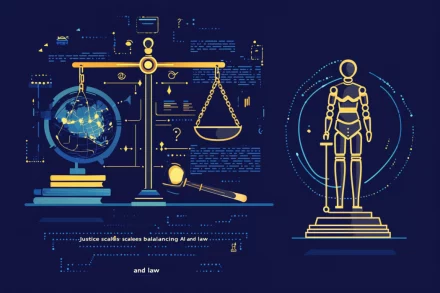
Symbolic image: The challenges of legal regulations.
The imperative to study international approaches to AI regulation cannot be overstated. Singapore’s AI Governance Framework serves as an exemplary model, promoting the ethical and responsible deployment of AI. This framework provides nuanced guidelines for AI application, anchored in the principles of transparency, fairness, and explainability, offering valuable insights for other nations crafting their AI governance strategies.
Cultivating Armenia’s Legal Landscape:
While Armenia has yet to implement specific legislation governing AI, the rapid evolution of technology underscores the urgency of developing a robust legal framework. This proactive approach will position Armenia to harness AI’s potential while mitigating associated risks, ensuring the nation’s legal ecosystem keeps pace with global technological advancements.
6. Revolutionizing Legal Education in the AI Era
The ascendancy of AI in the legal profession necessitates a paradigm shift in legal education, preparing the next generation of lawyers for a technology-driven future.
Integrating AI into the Legal Curriculum:
Prestigious law schools are spearheading the integration of AI and technology courses into their curricula. Harvard Law School’s “Artificial Intelligence and Law” course stands as a paragon, offering students a comprehensive exploration of AI’s impact on legal practice and policy. This course exemplifies the forward-thinking approach needed to equip future legal professionals with the knowledge and skills essential for navigating an AI-augmented legal landscape.
Cultivating Next-Generation Legal Skills:
The legal professionals of tomorrow must be adept in a new set of skills, encompassing data analysis, machine learning fundamentals, and programming basics. This multidisciplinary skill set will enable them to leverage AI tools effectively and comprehend their capabilities and limitations. A prescient Deloitte report forecasts that by 2030, lawyers with technological proficiency will be in high demand in the legal services market, underscoring the importance of tech-savvy legal education.
Empowering Practicing Lawyers through Continuous Learning:
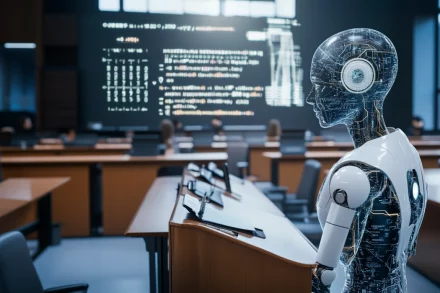
Symbolic image: AI training for lawyers.
For seasoned legal professionals, ongoing education in AI is paramount. Leading law firms and professional associations are pioneering innovative training programs to facilitate lawyers’ adaptation to emerging technologies. The American Bar Association (ABA), for instance, offers a comprehensive suite of online courses exploring the intersection of AI and law, enabling practitioners to stay at the forefront of technological advancements in their field.
Pioneering AI Education in Armenian Universities:
Armenian institutions of higher learning must proactively respond to these global trends by initiating discussions on introducing AI and law courses. This forward-thinking approach will ensure that Armenia’s future legal professionals are well-equipped to compete in an increasingly tech-driven global legal market.
7. Envisioning the Future: AI’s Transformative Impact on Law
The ongoing evolution of AI promises to continue reshaping the legal landscape profoundly. Here, we explore key trends and predictions that will define the future of law in the age of AI.
Forecasts and Emerging Trends:
Gartner’s authoritative prediction posits that by 2024, over 20% of legal departments’ expenditure will be allocated to AI technology implementation. This significant shift underscores AI’s imminent transition from a novel tool to an indispensable component of legal practice.
Pioneering Applications on the Horizon:
The potential applications of AI in law are expanding into increasingly sophisticated domains. AI systems are poised to conduct complex legal analyses, such as predicting litigation outcomes with unprecedented accuracy or assessing the far-reaching implications of legislative changes. Trailblazing companies like Blue J Legal are at the vanguard, developing cutting-edge AI systems capable of forecasting judicial decisions in specialized areas such as tax and labor law with remarkable precision.
The Metamorphosis of Legal Practice:
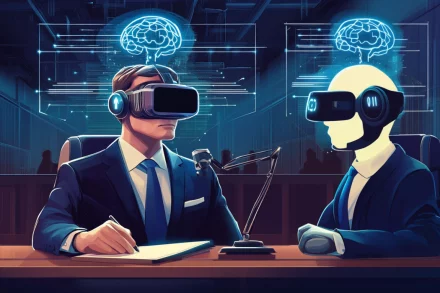
Symbolic image: A lawyer in a virtual world with AI.
The legal profession stands on the cusp of a profound transformation, evolving into a more technologically integrated field. As AI systems assume responsibility for routine tasks, legal professionals will increasingly focus their expertise on solving complex problems, providing strategic counsel, and navigating intricate ethical dilemmas. This shift represents not a diminishment of the lawyer’s role, but rather an elevation to higher-order cognitive tasks that leverage uniquely human capabilities.
Armenia’s Potential as a Legal Tech Hub:
Armenia, with its burgeoning IT sector, possesses immense potential to emerge as a leader in legal technology development. The synergistic collaboration between Armenian legal experts and skilled programmers could catalyze the creation of groundbreaking solutions with global applicability, positioning Armenia at the forefront of legal innovation on the international stage.
8. The Armenian Lawyers’ Association: Spearheading Legal Technology Initiatives
Comprehensive Overview of the Armenian Lawyers’ Association’s Pioneering Efforts:
The Armenian Lawyers’ Association (ALA) is at the vanguard of legal technology development in Armenia. Through its innovative “LegalTech Armenia” series on iravaban.net, ALA provides comprehensive coverage of advancements in legal technologies. The Association is poised to launch a groundbreaking educational initiative at one of Armenia’s premier universities, introducing a cutting-edge curriculum focused on legal tech. Furthermore, ALA is actively engaged in shaping the legal framework for artificial intelligence and blockchain technologies, while collaborating closely with governmental bodies to enhance the nation’s e-justice system.
Visionary Perspective from ALA President Karen Zadoyan:

The photo shows members of the ALA board.
In an exclusive interview with iravaban.net, ALA President Karen Zadoyan offered profound insights:
“The integration of artificial intelligence in law firms has transcended being merely a competitive advantage; it has become an absolute necessity. AI empowers law firms to significantly enhance the quality of legal services, optimize operational costs, and respond to client needs with unprecedented agility. However, this technological revolution also brings forth complex ethical and legal challenges. It is imperative that we ensure AI deployment does not compromise client confidentiality or lead to unfair competitive practices. ALA is devoted to addressing these critical issues, striving to cultivate a legal environment in Armenia that facilitates the effective and ethical implementation of AI systems in legal practice.”
9. Conclusion: Embracing the AI Revolution in Law
Artificial Intelligence is fundamentally reshaping the legal landscape, ushering in an era of unprecedented opportunities and formidable challenges.
Recapitulation of Key Insights:
- AI has already permeated critical areas of legal practice, including research, document analysis, and contract drafting, revolutionizing traditional methodologies.
- The strategic deployment of AI significantly enhances efficiency, reduces operational costs, and democratizes access to legal services, marking a new chapter in the administration of justice.
- Pressing ethical considerations, including ensuring AI impartiality, maintaining transparency, and safeguarding data privacy, demand innovative solutions and rigorous oversight.
- Legal education must undergo a paradigm shift, incorporating AI and technology courses to prepare the next generation of lawyers for a tech-driven legal landscape.
The Pivotal Role of AI in Shaping the Future of Law:
AI is poised to become an indispensable component of legal practice. Legal professionals who master the art of leveraging AI tools will gain a significant competitive edge in the evolving market. However, it is crucial to understand that AI will not supplant human lawyers but rather redefine their role, elevating the focus to complex problem-solving, strategic analysis, and nuanced ethical decision-making that require uniquely human cognitive abilities.
A Clarion Call for Balanced Progress:
As we stand at this technological crossroads, it is imperative to strike a delicate balance between harnessing the transformative potential of AI and upholding the fundamental ethical principles that underpin the legal profession. This equilibrium necessitates a collaborative effort among legal professional associations, law firms, technology innovators, and legislators to craft a robust legal framework that fosters innovation while steadfastly protecting human rights and the cornerstones of justice.
Armenia’s Promising Trajectory in Legal Innovation:

Symbolic image: A lawyer and AI – the team of the future.
Armenia, with its dynamic IT sector and rich legal tradition, is uniquely positioned to emerge as a global leader in legal technology development. The synergistic collaboration between Armenian legal experts and cutting-edge technologists holds the promise of yielding innovative solutions with far-reaching impact, not only within Armenia but on the global legal stage.
Closing Reflections:
- The AI revolution is reshaping the legal profession, presenting both unprecedented opportunities and complex challenges that demand thoughtful navigation.
- A nuanced, balanced approach is essential in leveraging AI’s capabilities while steadfastly upholding ethical standards and the rule of law.
- Armenia stands at the threshold of becoming a pivotal hub for legal technology innovation, poised to make significant contributions to the global legal tech landscape.
- Interdisciplinary collaboration among legal professionals, technologists, ethicists, and policymakers is crucial for the responsible and effective integration of AI in legal practice.
Epilogue
We invite you to anticipate the forthcoming sixth installment in the groundbreaking “LegalTech Armenia” series, a collaborative effort by the Armenian Lawyers’ Association and Iravaban.net. Our next exploration, titled “Data Science and Law: The Future Lawyer’s Toolkit,” will delve into the revolutionary impact of data analysis on legal research and decision-making processes. We will unveil how forward-thinking legal professionals can harness the power of big data and machine learning to dramatically enhance the efficacy and precision of their practice, ushering in a new era of data-driven jurisprudence.
The series was conceived by Karen Zadoyan, the president of the Armenian Lawyers’ Association.


















